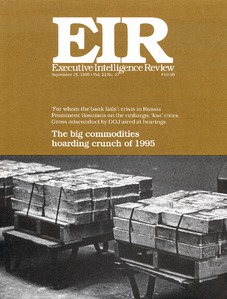Special Report
The End of an Era: It’s Time for LaRouche’s Remedies
by Christopher White
Introduces a panel on the economic crisis at the semi-annual conference of the Schiller Institute and International Caucus of Labor Committees. Analyzing the market basket of household and producer goods of the U.S. economy in 1967, when the economy was still operating at a profit, he shows how the current crisis we face is systemic, and cannot be repaired by administrative measures.
Speculation Takes Over the U.S. Economy
by Anthony Wikrent
Analyzes how the post-industrial policy of the past 30 years has radically altered the relationship of money and finance to the real economy.
The Financial Burden Is Not Sustainable
by John Hoefle
Documents the rising financial claims against the physical economy, claims which have to be paid by a diminishing number of productive workers.
Commodities Hoarding Signals Imminent Financial Collapse
by Richard Freeman
Reports how the international financial oligarchy is grabbing up physical assets, shifting out of the speculative bubble—a sure sign that the bubble is about to pop.
Do You Want To Eat Next Year?
by Marcia Merry Baker
Documents the decline of food production worldwide, which is creating the conditions for widespread shortages—the result of the deliberate policies of the food cartels.
Interviews
Muhammed Filippovic
He is a professor at Sarajevo University, ambassador to London of the Republic of Bosnia-Hercegovina, and a member of the Presidency of the Republic of Bosnia-Hercegovina.
Stjepan Kluic
Professor Kluic is a member of the Presidency of Bosnia-Hercegovina and head of the Republican Party of Bosnia. He is a Catholic of Croatian origin.
Mitko Lazovic
A member of the Presidency of the Republic of Bosnia-Hercegovina, president of the Parliament of the Republic, and a member of the executive, Social Democratic Party of Bosnia-Hercegovina, Mr. Lazovic is Serbian Orthodox.
Jovan Diviak
General Diviak of the Army of Bosnia-Hercegovina is Serbian Orthodox.
Francis Boyle
He is Professor of International Law at the University of Illinois at Champaign.
Departments
Editorial
A Pact with the Devil.
Economics
Opposition Grows to Russia’s IMF-Dictated Shock Therapy
by Konstantin George
if a reversal of economic policies is not effected soon, the danger of Russia sinking into chaos becomes quite real. One sign of hope: On Sept. 4, the opposition group known as the Congress of Russian Communities inaugurated its electoral campaign by presenting its top five candidates.
For Whom the Bank Fails
by Roman Bessonov
Explains the relationships between the August bank crisis in Russia and the election campaign.
Bankers Are Jittery about Argentina
by Cynthia R. Rush
Harvard-trained Finance Minister Cavallo, the architect of Argentina’s “convertibility plan,” the radical free-market austerity program imposed in 1991, is rumored to be about to resign.
Business Briefs
International
Greenpeace Caught in Norway, Runs Amok in South Pacific
by Helmut Böttiger
The ecology multinational had to eat crow over its “Operation Brent Spar” disinformation campaign. But it is going full tilt with the London-dictated terror campaign against French President Jacques Chirac.
Prominent Bosnians Express Concern over Arms Embargo, ‘Lost’ Cities
by Katharine Kanter
EIR interviewed several prominent Bosnians, including members of the Presidency between Aug. 31 and Sept. 4 in Germany.
First Lady Takes Beijing by Storm
by William Jones
“It is a violation of human rights when women are denied the right to plan their own families, and that includes being forced to have abortions or being sterilized against their will,” Mrs. Clinton said at the UN Fourth Conference on Women.
International Intelligence
National
Gross Misconduct by DOJ Aired at Special Hearing
by Debra Hanania Freeman
Independent hearings held Aug. 31-Sept. 1 near Washington heard evidence on three topics: the harassment of African-American elected and public officials; the conduct of the Justice Department’s Office of Special Investigations, particularly the cases of John Demjanjuk and Kurt Waldheim; and the case of Lyndon LaRouche.
LaRouche Scores DOJ ‘Hit Squads’
by Lyndon H. LaRouche, Jr.
LaRouche Movement Debates ‘Heavy Ideas’ To Save Civilization
The ICLC-Schiller Institute semiannual conference gathered some 1,200 activists under the banner, “1995-1996, Year of Decision.”
Contract with America To Sacrifice Elderly, Children, Disabled
by Linda Everett
Because the Medicare and Medicaid programs are so central to the country’s hospital and health care financing structure, no one will escape the Contract with America’s knife. An exposé.
National News



